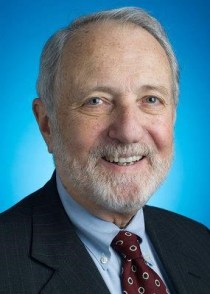Syracuse University’s College of Law has rechristened its low-income taxpayer clinic as the Sherman F. Levey ’57, L’59 Low Income Taxpayer Clinic. The new name honors the clinic’s founder and longtime co-director, Rochester attorney Sherman Levey.
A tax and estate-planning attorney who died in 2018, Levey was an SU undergraduate and law school graduate who later taught at the university’s law school as an adjunct professor.

Calling Levey “an extraordinary lawyer,” former SU law school dean and Nazareth College president emeritus Daan Braveman recalls him as “a gifted teacher who … felt strongly about issues of social justice.”
Braveman, currently senior higher education counsel in Harter, Secrest & Emery LLP’s Rochester office, remembers Levey as highly respected among fellow attorneys in Rochester and beyond.
Low-income taxpayer clinics provide free help to individuals who meet certain income guidelines or are not proficient English speakers. The Internal Revenue Service partially funds such clinics, which otherwise operate independently of the IRS.
Helping to secure funding for the Syracuse LITC, Levey started the tax clinic in 2002. The clinic does double duty, providing help to low-income taxpayers and serving as a teaching tool for SU law students.
Syracuse LITC director Robert Nassau III was recruited by Levey to help run the clinic at its start as an adjunct professor. Later, along with Levey, he became the clinic’s co-director.
Nassau calculates “the cash money we have been able to put into people’s pockets since the start of the LITC (as approaching) $2 million.”
That amount, says Nassau, does not include some $200,000 a year the clinic’s student attorneys save for clients by helping to cut amounts clients have to pay to the IRS. Nor, he adds, does it include the incalculable instructional value of LITC experience for law students.
Brian Krastev, a 2020 SU law school graduate, is now an international tax associate with the Big 4 accounting firm PwC in New York City. He remembers his Syracuse LITC experience as “about developing empathy quality that there’s just no way you get from law books or lectures.”
The Syracuse LITC is staffed by 10 students who put in seven hours of work each week during SU’s 14-week semester, or a total of 1,000 hours of pro-bono service provided by LITC’s student lawyers annually.
A onetime tax partner with Boylan Code in Rochester, Nassau met Levey as a tax-law colleague in Rochester. Levey ran a tax practice with a partner, Sydney Rubin, which later merged with Harris Beach PLLC. He finished his career as an of counsel attorney with Boylan Code.
From its start, says Nassau, the LITC was “Sherm’s baby.”
Levey’s daughter, Lynne Levey, herself an SU law graduate, has taught legal writing at the SU law school since 2006.
Noting that her father, whose own father died when he was 17, would not have been able to attend college had SU not given him a scholarship to study accounting and law, Lynne Levey calls her father’s founding of and support for the Syracuse LITC “a circle of life thing … because he himself began as a low-income taxpayer.”
Will Astor is Rochester Beacon senior writer. The Beacon welcomes comments and letters from readers who adhere to our comment policy including use of their full, real name. Submissions to the Letters page should be sent to [email protected].
Sherm was a class act; both as a professional and as a human being!